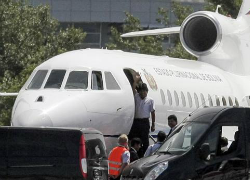After attending a conference in Moscow, Bolivian president Eva Morales boarded a private airplane and began his journey home. However, shortly after departure, the plane was diverted to Vienna, Austria, a detour not originally planned by the president or his crew. Upon landing, it was reported that France, Portugal, Italy, and Spain had refused to allow Morales’ plane to pass through their airspace or, alternatively, conditioned passage on getting consent to search Morales’ plane once it was on the ground. Without a viable place to refuel, Morales was forced to land his plane in Vienna, where, allegedly without Bolivia’s permission, his plane was searched by airport police officers. Nothing – or no one – of interest was found. As a result, Bolivian officials are alleging their president was “kidnapped by imperialism” and that certain European countries had violated international law.

The root cause of the incident can be traced back to an interview of Morales in Moscow, just days before he was scheduled to fly home, in which the president indicated that Bolivia would “consider the idea” of granting asylum to Edward Snowden, the infamous whistle blower wanted by the United States for espionage. The United States, seemingly unable to compel cooperation from its allies, attempted to downplay international support of the former 30-year-old NSA contractor by saying it would not “scrambl[e] . . . jets or engag[e] in high-level diplomatic bartering” to have Snowden returned to the states. Technically, it has done neither of those things. But pressuring European countries to deny the passage of any plane that might be carrying Snowden, a tactic that arguably threatened the safety of Bolivia’s president, may be just as serious.
Already, the Union of South American Nations (Unasur) has agreed to hold an emergency meeting on the matter, and Bolivia’s UN ambassador has announced that the country will file a formal complaint with the UN, calling the incident an act of aggression. What exactly Bolivia plans to allege in its complaint is still unclear. It could narrowly define the incident as a breach of diplomatic protocol, or it could refer to the situation more generally, alleging that all states have the right to consider an application for political asylum free of pressure from more powerful states. Some are even calling it an act of piracy. Whether the actions of France, Portugal, Italy, and Spain are sanctionable remains unclear, but Bolivia feels strongly that, regardless, UN Secretary-General, Ban Ki-moon, should intervene.
As details of the incident continue to surface, one thing is clear; Snowden has done more than expose secret U.S. surveillance programs. He set off a chain of events that has helped emphasize the need for a strong international legal system in a world that has become increasingly interconnected. After all, it is international law that “provides . . . stability and order and . . . a means of predicting the behavior of those with whom we have reciprocal legal obligations.” Hopefully the United Nations will take this into account as the world watches to see how it responds.
J. Matt Thornton is a second year law student and a Staff Editor on the Denver Journal of International Law and Policy.

